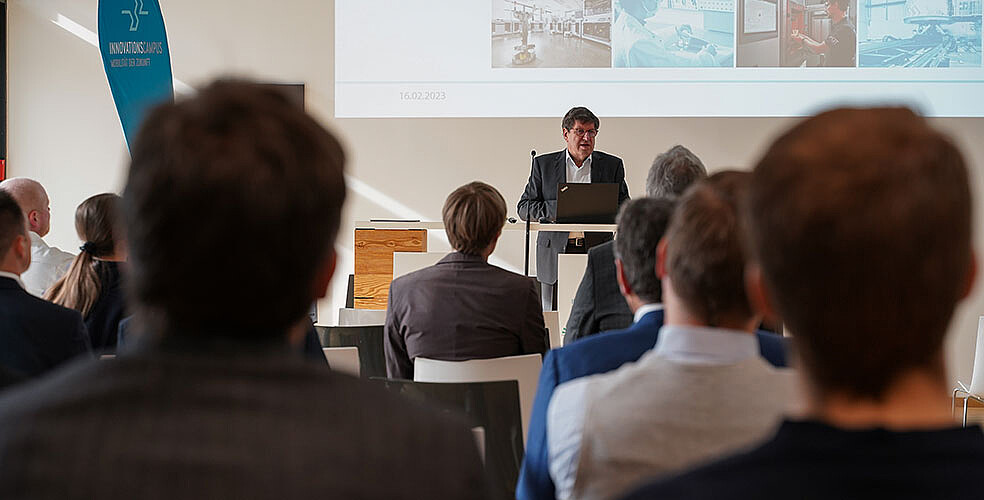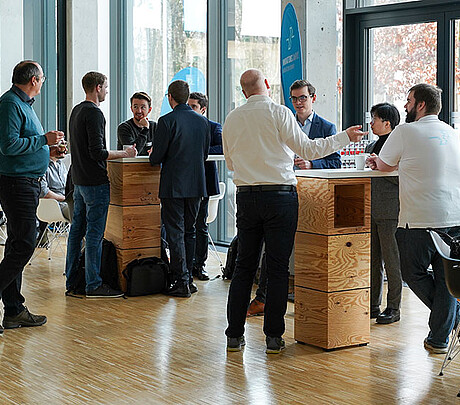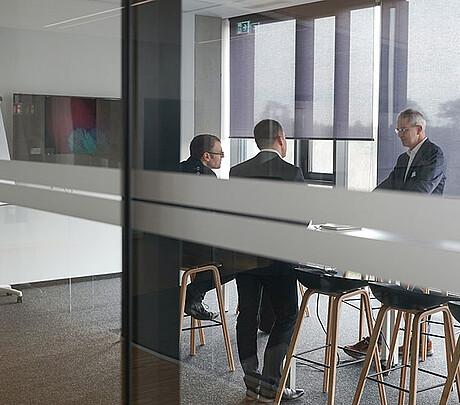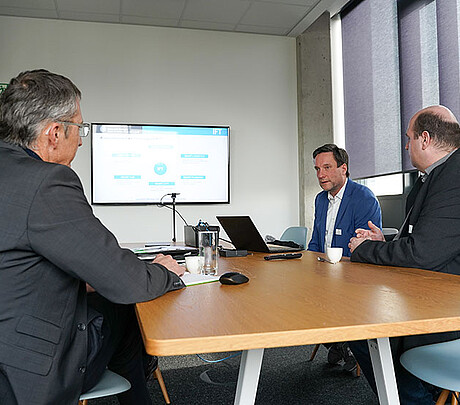Published on March 13, 2023
Blinddate with the future
The storm is followed by calm. At 1 p.m. on February 16, visitors could have heard a pin drop in the previously busy stairwell of the ZEISS Innovation Hub @ KIT. Unlike behind the closed doors of the adjacent meeting rooms. After the official welcome by Prof. Thomas Hirth, Vice President for Transfer and International Affairs of KIT, the Hackathon of the InnovationChallenge Sustainable Production and Mobility 2023 was presented, talked about, discussed, and listened to there. It was about open questions of the participating small and medium-sized enterprises (SMEs) and start-ups on their way to resource-efficient, sustainable mobility solutions and production technologies. With the funding program, the InnovationCampus Mobility of the Future (ICM) links the corporate world with the research infrastructure of universities in Baden-Württemberg. "The InnovationChallenge does not simply seek answers to research questions from the business world, but lays the foundations for the innovations that will strengthen the state for the future," says Sandra Kauffmann-Weiß, managing director of the ICM.
Twelve companies were able to translate their problem from practice into a challenge with a scientific question. In 19 pitches, 10 research groups from three universities tried to convince the companies of their approaches. The representatives of the medium-sized companies and start-ups did not know what exactly the researchers would present. That's why the 45-minute pitches depended not only on the right answers, but also on good teamwork. After all, it also depends on whether the concepts become concrete research projects from which innovative solutions for practical applications can emerge.
Which pitches will lead to further collaboration will be decided in the coming weeks. If a company is convinced by an approach, it can form a consortium with the university partner and enter the bidding process for government funding with a joint application. In the first round, the companies must bid at least 5,000 euros in addition to the funding from the Baden-Württemberg Ministry of Science, Research and the Arts. In the next rounds, the bids can be increased. However, placement in the funding rankings depends not only on the amount of capital invested, but also on the size of the company. Smaller companies and start-ups are given preference. What sounds like a lengthy process is actually quick. The funding commitments are to be issued as early as March 16, so that work on the projects can begin in May. The duration of the projects is limited to 18 months. The future will not wait.
Uncomplicated, intensive and practice-oriented: What companies and universities say about the InnovationChallenge
Andreas Wolf from automation specialist robomotion appreciates thinking outside the box:
"Through the format, smaller and medium-sized companies get a quick answer to their question. In addition, the more open scientific approach of the university teams gives us insights into possible solutions that go beyond the actual objective."
Daniel Stelzer from OTEC sees the format as a unique opportunity for medium-sized companies:
"With the InnovationChallenge, we can set universities tasks that we can hardly solve on our own. There are few other programs that give medium-sized companies such fast and uncomplicated access to research projects."
Implementation in practice is an important aspect for Johannes Schubert from the Institute for Production Technology (wbk) at KIT:
"I like the fast pace of the InnovationChallenge. If a commitment is made, only three months pass between the hackathon and the start of the research work. That way, you stay mentally involved in the topic throughout the entire process. I am also positively surprised by the intensity of the pitches. The pitches last much longer than in other research projects, which makes more in-depth content and also direct feedback possible."
Professor Robert Schulz of the Institute for Materials Handling and Logistics (IFT) at the University of Stuttgart praises the intensity of the hackathon:
"I like the fast pace of the InnovationChallenge. If a commitment is made, only three months pass between the hackathon and the start of the research work. That way, you stay mentally involved in the topic throughout the entire process. I am also positively surprised by the intensity of the pitches. The pitches last much longer than in other research projects, which makes more in-depth content and also direct feedback possible."
Tassilo Arndt from the Institute of Production Engineering (wbk) at KIT is curious about the further course of events:
"Exciting discussions on relevant and practical research topics - the hackathon provided the right framework for this. The outcome of the bidding process will now be exciting once again!"





comments about this article
No Comments